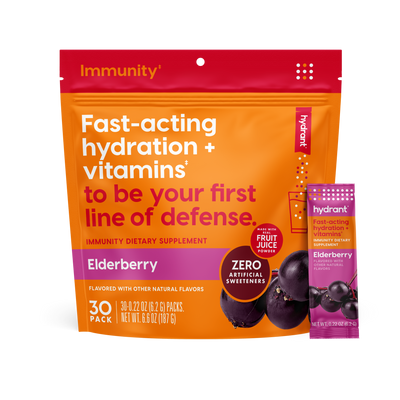We exert energy every day when engaging in activities like swimming, jogging, playing sports, or taking a stroll outside. These physical activities often lead to our bodies losing fluids through sweat—but losses of water within our body don't only occur when it's hot out! You can lose water when exerting yourself in a cooler area like a pool or a lake.[1] If you want to stay ahead of dehydration, your body needs to replenish the fluids it loses.
We're here to give you the ins and outs of hydration by discussing:
- What groups are most at risk for dehydration
- The science behind dehydration
- Signs of dehydration
- How to Hydrate
- The benefits of dehydration
- The role of electrolytes in hydration
Dehydration happens as the body loses more fluids than it's taking in.[3] When you lack proper fluids, your body will have difficulty carrying out its normal functions effectively which will result in you feeling less than swell.[3]
It's helpful to know that certain age groups sit at a higher risk of experiencing dehydration than others.
Dehydration: Age-By-Age
1. Kids

Risks: Kids below nine sit at a higher risk for experiencing dehydration than adults.[3] The major reasons that kids experience dehydration is their lack of familiarity with the science of dehydration and having less experience speaking up for themselves to address their needs.
Warning signs: If you’re looking to help your kids avoid dehydration, do your best to pay full attention to them on hot days and look out for the following signs:[3]
- Reduced bathroom breaks
- Cold or dry skin
- Inactiveness or reduced energy
- Increased heart rate
For babies and toddlers, watch out for uneasiness, sunken eyes, or a lack of tears when crying.[3]
Recommended drinking amounts: The water level that children should drink in ounces should be equivalent to their age.[4] An example of this would be a two year old, consuming two ounces of water regularly throughout the day.
2. Teens:
Risks: Teens regularly engage in activities that require a lot of energy, but they sit at a lower risk for experiencing dehydration due to their ability to speak for themselves and address their needs.
Recommended drinking amounts: Experts recommend that teens consume 6-8 cups of water per day.[5]
3. Adults
Risks: Modern adult routines are more dehydrating than ever. Regularly scheduled fitness routines, demanding work schedules, and time spent managing kids are all catalysts for dehydration.
Recommended drinking amounts: The Institute of Medicine recommends that adult men consume 13 cups of water daily and that women drink nine cups of water per day.[5]
4. Aging Adults

Risks: As we age, the ability of the body to detect dehydration reduces.[3] Older adults retain less fluid in their bodies and can't detect thirst as easily.[3] An elderly person who is dehydrated should be taken to a cool place and given sufficient water to quench their thirst. Cold compresses, cool showers and baths can be useful when looking for ways to cool an elderly person down at a more accelerated rate.[6]
Recommended drinking amounts: The quantity of water recommended for elderly people to consume is near the level of healthy adults at 7 cups per day.[7] An aging adult will have an easier time staying hydrated if they consume smaller amounts of water more regularly throughout the day.[7]
Let's examine the specific signs of dehydration so you can help a person that needs to be treated—no matter their age.
Signs of Dehydration
The body is smart and has its way of alerting you that you are dehydrated. Thirst is a significant indicator of dehydration across various age groups.[3] Other symptoms to watch out for when you are dehydrated include:[3]
- Dark- yellow colored urine
- Dry and chapped lips
- Dry skin
- Moodiness
- Headaches
- Dizziness (sometimes)
If you’re looking to avoid the above symptoms, keep on reading for some tips on keeping yourself hydrated!
Tips on Staying Hydrated
One of the best strategies to remain hydrated is to know when to drink water. The four best times to drink water are:
- When you just wake up: Naturally, your body will become dehydrated after sleeping for an average of 6-8 hours every night as you're going through a prolonged period without water consumption. Starting your day with water is a great way to jumpstart your body and put yourself on the path to hydration. By hydrating in the morning, your level of alertness will be raised, and your metabolism will receive a helping hand.[8]
- Before eating: Contrary to general belief, drinking water before meals is a great practice. Having a glass of water 30 minutes prior to a meal can aid digestive abilities.[9]
- Before and After a Workout: The appropriate time to drink water is about 2-3 hours before the onset of your daily exercises.[10] Drinking sufficient amounts of water lubricates the joints and can prevent cases of muscle tears or cramps.[11] At the end of your daily exercise, drink water to replenish any lost fluid from sweat.
- When you Feel Thirsty: The most apparent reason for drinking is thirst. Listen to your body and drink whenever you get thirsty. If you're thirsty, you're already partially dehydrated![3]
- Make Hydrating an Easy Task: Carrying a portable water bottle with you, whether you're at home or on the go, is a great way to make hydrating an accessible task.

Let's wrap by discussing how people of all ages need electrolytes to stay hydrated.
How Electrolytes Foster Hydration
Hydration won’t occur without electrolytes as these minerals feature an electronic charge that balance the amount of water within your body.[14] Sometimes, water alone isn’t enough. If you’re losing fluids or looking for complete hydration, drinks containing a balanced profile of electrolytes can help rehydrate you faster and bring on a host of benefits.[12]
Some of the most essential electrolytes contribute toward:[13]
- Fluid balance (Sodium)
- Keeping muscles loose to avoid cramps (Potassium)
- Regulating muscle contractions and heart rhythms (Calcium)
- Relaxing muscles (Magnesium)
- Delays in fatigue (Bicarbonates)
How Hydrant Can Help with Hydration
We’re pretty proud of our products. Each drink mix contains a balanced level of electrolytes based on the World Health Organization's guidelines for oral rehydration.[15] Our science-backed proprietary formula helps you hydrate with an electrolyte ratio of sodium and potassium that mirrors your bloodstream. It’s refreshing, delicious, and easy to carry with you.
The Bottom Line
While some groups sit at a higher risk of experiencing dehydration than others, anybody of any age can experience dehydration. Make sure to proactively hydrate to help keep your body ahead of dehydration. If you hydrate consistently, look out for symptoms of dehydration, and understand where you stand in terms of your risk, you'll have an easier time keeping yourself safe and healthy.















